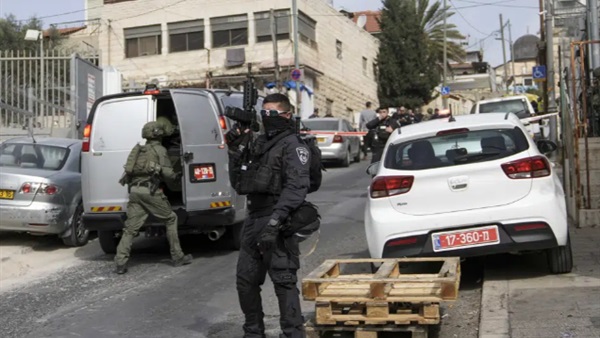Palestinian teen wounds 2, day after 7 killed in Jerusalem

A 13-year-old Palestinian attacker opened fire in east
Jerusalem on Saturday, wounding two people, officials said, a day after another
assailant killed seven outside a synagogue in the deadliest attack in the city
since 2008.
The shooting in the Palestinian neighborhood of Silwan in
east Jerusalem, near the historic Old City, wounded a father and son, ages 47
and 23, paramedics said. Both were fully conscious and in moderate to serious
condition in the hospital, the medics added.
As police rushed to the scene, two passers-by with licensed
weapons shot and overpowered the 13-year-old attacker, police said. Police
confiscated his handgun and took the wounded teen to a hospital. Video showed
police escorting a wounded young man, wearing nothing but underwear, away from
the scene and onto a stretcher, his hands cuffed behind his back. Authorities
taped off the street, emergency vehicles and security forces swarmed the area
and helicopters whirled overhead.
“He waited to ambush civilians on the holy Sabbath day,”
Israeli police spokesman Dean Elsdunne told The Associated Press, adding that
the teenager opened fire on a group of five civilians. Security footage showed
the victims to be observant Jews, wearing skullcaps and tzitzit, or knotted
ritual tassles.
Elsdunne described a “significant rise” in the level of
Palestinian militant activity in recent days. “The Israeli police are going to
act accordingly,” he said.
Saturday’s events — on the eve of U.S. Secretary of State
Antony Blinken’s arrival in the region — raised the possibility of even greater
conflagration in one of the bloodiest months in Israel and the occupied West
Bank in several years. On Friday, a Palestinian gunman killed at least seven
people, including a 70-year-old woman, in a Jewish settlement in east
Jerusalem, an area captured by Israel in 1967 and later annexed in a move not
internationally recognized.
The attacks pose pivotal test for Israel’s new far-right
government. Its firebrand minister of national security, Itamar Ben-Gvir, has
presented himself as an enforcer of law and order and grabbed headlines for his
promises to take even stronger action against the Palestinians.
The Israeli army said it had deployed another battalion to
the West Bank on Saturday, adding hundreds more troops to a presence already on
heightened alert in the occupied territory.
In the Jenin refugee camp, the site of a deadly Israeli
military raid on Thursday that fueled the latest escalation, footage showed
Palestinians dancing and cheering in celebration of the shooting on Saturday.
Palestinian detainees who celebrated in prison after Friday’s attack were
placed in solitary confinement, the Israeli prison service said.
Prime Minister Benjamin said he would convene his Security
Cabinet later, after the Sabbath, which ends at sundown, to discuss a further
response to the attack near the synagogue. Security forces launched a crackdown
in east Jerusalem, fanning out into the neighborhood of the 21-year-old
Palestinian gunman, who was shot and killed at the scene. Police arrested 42 of
his family members and neighbors for questioning in the At-Tur neighborhood.
Police Chief Kobi Shabtai permanently moved a force
analogous to a S.W.A.T. team in the city and beefed up forces, instructing
police to work 12-hour shifts. He urged the public to call a hotline if they
see anything suspicious.
The earlier Friday attack came a day after an Israeli
military raid killed nine Palestinians in the flashpoint Jenin refugee camp in
the West Bank that prompted a rocket barrage from Gaza and retaliatory Israeli
airstrikes.
Although calm had appeared to take hold after the limited
exchange of fire between Israel and Gaza militants, tensions were running high
in Jerusalem and the West Bank.
Thursday’s raid, deadliest single incursion in the West Bank
since 2002, followed a particularly bloody month that saw at least 30
Palestinians — militants and civilians — killed in in confrontations with
Israelis in the West Bank, according to a tally by the AP.
Last year, as the Israeli military intensified its arrest
raids following a string of deadly Palestinian attacks within Israel, at least
150 Palestinians were killed in the occupied West Bank and east Jerusalem. It
was the highest annual death toll for more than a decade and a half. Thirty
people were killed in Palestinian attacks against Israelis last year.
Israel says most of the dead were militants. But youths
protesting the incursions and others not involved in the confrontations also
have been killed.
The Israeli military contends its raids are meant to
dismantle militant networks and thwart attacks. But Palestinians say they
further entrench Israel’s 55-year, open-ended occupation of the West Bank,
captured along with east Jerusalem and the Gaza Strip in the 1967 Mideast war.
The Palestinians demand east Jerusalem as the capital of a future independent
state, and much of the world considers it illegally occupied. Israel claims as
its united, sovereign capital.
Home to the shrines of all three major monotheistic
religions, the contested capital been the centerpiece of spiking tensions
between Israelis and Palestinians for years.
Both Palestinian attackers behind the shootings on Friday
and Saturday came from east Jerusalem. Palestinian residents of east Jerusalem
hold permanent residency status, allowing them to work and move freely
throughout Israel, but they are not allowed to vote in national elections.
Residency rights can be stripped if a Palestinian is found to live outside the
city for an extended period or in certain security cases.
Although their standard of living is generally better than
in the West Bank and Gaza, Palestinian residents of the city receive a fraction
of the services that Jewish residents do. They also complain of home
demolitions and the near impossibility of obtaining Israeli building permits.





